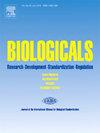多种因素影响着拉丁美洲和加勒比疫苗开发和生产的技术转让
IF 1.5
4区 生物学
Q4 BIOCHEMICAL RESEARCH METHODS
引用次数: 0
摘要
2019冠状病毒病大流行凸显了拉丁美洲和加勒比地区在获得药品和紧急用品(包括疫苗)方面持续存在的严重不平等现象。从区域角度来看,有必要改善条件,确保在正常情况下和未来生物威胁期间更公平和包容地获得卫生技术。技术转让成为永久避免全球和区域疫苗供应短缺的有效工具。在这里,我们通过对公开文件的研究和对该地区和国际机构专家的采访,描述了全球和区域技术转移的生态系统,其参与者、角色、相互作用和演变。此外,我们确定并分析了疫苗项目,描述了该地区项目的类型,提出了三个时间阶段的演变,揭示了2019冠状病毒病大流行的教训,并确定了加速拉丁美洲和加勒比地区疫苗技术转让的四个驱动因素。这些驱动因素包括:(一)加强疫苗管理能力;(二)采用行业标准;(三)提高生产能力、研发能力和人力资源;(iv)考虑总需求。最后,我们提出建议,最大限度地发挥拉丁美洲和加勒比科技和疫苗生产能力的潜力。它们涉及四个驱动因素:促进互补性产业、数据获取和可用性政策、机构间对话和协调、公共卫生考虑以及信息不透明领域的未来工作。本文章由计算机程序翻译,如有差异,请以英文原文为准。
Multiple factors shape technology transfer for the development and manufacture of vaccines in Latin America and the Caribbean
The COVID-19 pandemic highlighted significant inequalities in access to medicines and emergency supplies, including vaccines, that persist in Latin America and the Caribbean. From a regional perspective, it is necessary to improve the conditions to ensure more equitable and inclusive access to health technologies, both in normal scenarios and during future biological threats. Technology Transfer emerges as an effective tool to permanently avoid scarcity in global and regional vaccine supplies.
Here we describe the global and regional ecosystem of Technology Transfer, its actors, roles, interactions, and evolution through research of publicly available documents and interviews with experts from the region and international institutions. Additionally, we identify and analyze vaccine projects, characterize typologies of projects in the region, suggest an evolution of three temporal phases, reveal lessons from the COVID-19 pandemic and identify four drivers that expedite vaccine Technology Transfer in Latin America and the Caribbean. These drivers include (i) strengthening of regulatory capacities for vaccines; (ii) adoption of trade standards; (iii) increasing manufacture capacity, R&D, and human resources; and (iv) consideration of aggregated demand.
Finally, we present recommendations to maximize the potential of scientific-technological and vaccine production capacities in Latin American and the Caribbean. They relate to the four drivers, the promotion of complementary industries, data access and availability policies, inter-institutional dialogue and coordination, public health considerations, and future work in areas of information opacity.
求助全文
通过发布文献求助,成功后即可免费获取论文全文。
去求助
来源期刊

Biologicals
生物-生化研究方法
CiteScore
3.70
自引率
0.00%
发文量
39
审稿时长
48 days
期刊介绍:
Biologicals provides a modern and multidisciplinary international forum for news, debate, and original research on all aspects of biologicals used in human and veterinary medicine. The journal publishes original papers, reviews, and letters relevant to the development, production, quality control, and standardization of biological derived from both novel and established biotechnologies. Special issues are produced to reflect topics of particular international interest and concern.Three types of papers are welcome: original research reports, short papers, and review articles. The journal will also publish comments and letters to the editor, book reviews, meeting reports and information on regulatory issues.
 求助内容:
求助内容: 应助结果提醒方式:
应助结果提醒方式:


